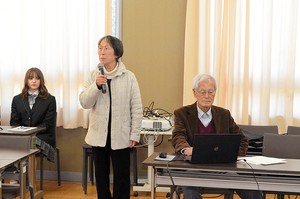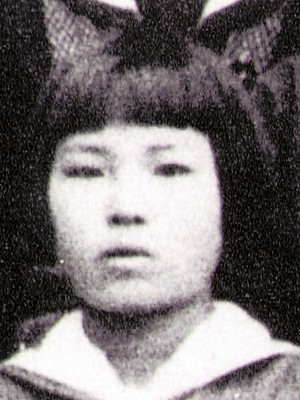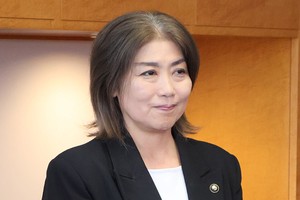THE ASAHI SHIMBUN
June 25, 2021 at 15:30 JST
 Copies of the 'Akagi file' are piled up in a Diet meeting room where opposition lawmakers questioned Finance Ministry officials on June 24. (Koichi Ueda)
Copies of the 'Akagi file' are piled up in a Diet meeting room where opposition lawmakers questioned Finance Ministry officials on June 24. (Koichi Ueda)
Finance Ministry officials grudgingly admitted on June 24 that they deliberately withheld sensitive documents from opposition lawmakers who were seeking answers in a scandal over a dodgy sale of state-owned land.
The recent release of a folder of documents compiled by a ministry bureaucrat who committed suicide shattered the officials’ excuse that the information sought by the opposition may not even exist. The folder also contained emails showing that the officials were intent on concealing the papers and lying about them.
One opposition party lawmaker described the officials’ actions as an outrageous abuse of power.
The folder concerned falsified documents related to the sale of the land in Osaka to educational institution Moritomo Gakuen. Opposition parties have long argued the steep discount given for the land stemmed from the relationship between the Moritomo Gakuen founder and then first lady Akie Abe.
In April 2020, opposition lawmakers asked the Lower House research bureau to conduct a preliminary study into the land deal and requested relevant documents from the Finance Ministry, including the file compiled by Toshio Akagi, who worked at the Kinki Local Finance Bureau before taking his own life in March 2018.
But Finance Minister Taro Aso would not even acknowledge that the so-called Akagi file existed, citing the lawsuit that Akagi’s widow, Masako, filed against the ministry.
Toshio suffered from depression after following orders to falsify the documents, including the removal of references to Akie in the information about the land-sale negotiations.
The ministry finally disclosed the Akagi file to Masako on June 22. It included email exchanges between bureau officials and bureaucrats at the Finance Ministry in Tokyo.
Some of the exchanges regarded the opposition’s requests for documents.
One email said, “We have no intention of providing any documents to (opposition) lawmakers.”
Another said, “If we are asked to produce documents, we will say, ‘We asked the Kinki bureau to look for it, but they could not find anything.’”
On June 24, the directors of the Financial Affairs Committees of the two Diet chambers held an informal gathering where they questioned Finance Ministry officials.
According to lawmakers who attended the closed-door session, Tadashi Shimizu of the Japanese Communist Party asked Finance Ministry officials if those emails constituted an attempt to interfere with the right of Diet members to ask questions.
Yukihiro Oshika, the director-general of the Finance Ministry’s Financial Bureau, said, “I have no counterargument to that.”
Other emails sent to the Kinki Local Finance Bureau pointed out that Nobuhisa Sagawa, the Financial Bureau director-general at the time, had given clear instructions to falsify the documents so that they would match his responses in the Diet.
Takeshi Shina of the Constitutional Democratic Party of Japan said such orders would shake the functions of the Diet from its very foundation.
“There would be no meaning to Diet questioning if lies were told and public documents were compiled in line with those (false) statements,” Shina said.
He added that such outrageous abuse could not have been committed by a bureau director-general alone.
Shina asked Finance Ministry officials if Aso, then Prime Minister Shinzo Abe and then Chief Cabinet Secretary Yoshihide Suga had been consulted.
One official raised doubts on whether those talks existed.
“We are uncertain if there was such a consultation,” the official said.
At a different hearing by opposition lawmakers looking into the Moritomo Gakuen scandal, attention was focused on a meeting between Sagawa and Suga. That meeting was held five days after Abe said in the Diet on Feb. 17, 2017, that he would resign as prime minister and a Diet member if he or his wife were found to have played a role in the steep discount given to Moritomo Gakuen.
Finance Ministry officials denied that Suga instructed Sagawa to falsify documents. They said Suga only received an explanation because the issue was becoming a major one in the Diet.
(This article was written by Tamiyuki Kihara and Takashi Yoshida.)




















A peek through the music industry’s curtain at the producers who harnessed social media to help their idols go global.
A series based on diplomatic documents declassified by Japan’s Foreign Ministry
Here is a collection of first-hand accounts by “hibakusha” atomic bomb survivors.
Cooking experts, chefs and others involved in the field of food introduce their special recipes intertwined with their paths in life.
A series about Japanese-Americans and their memories of World War II